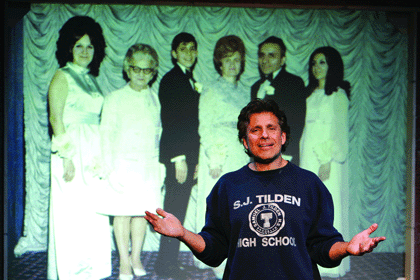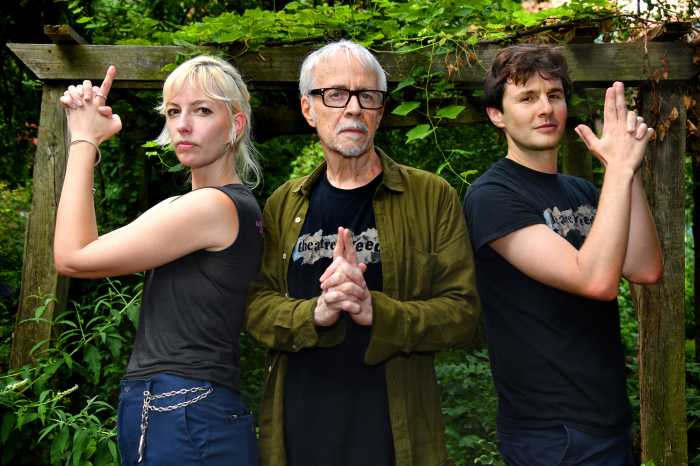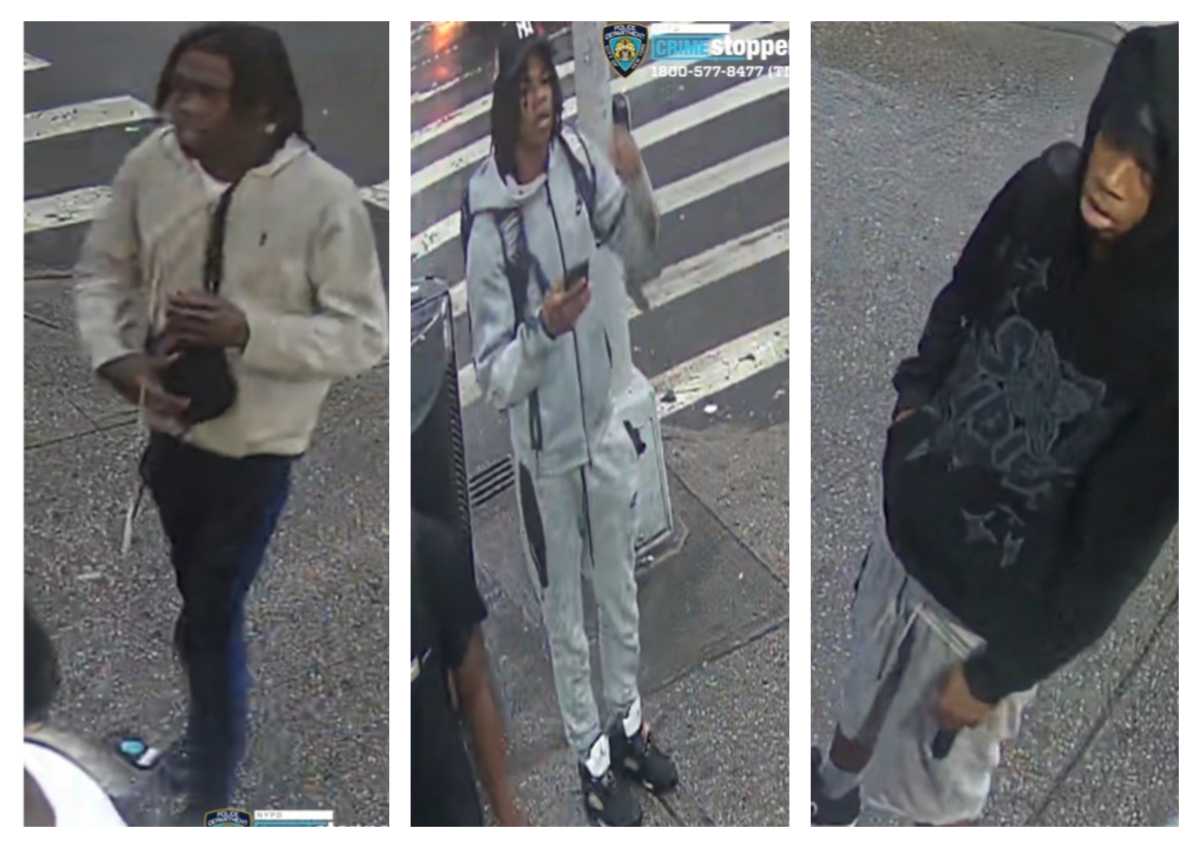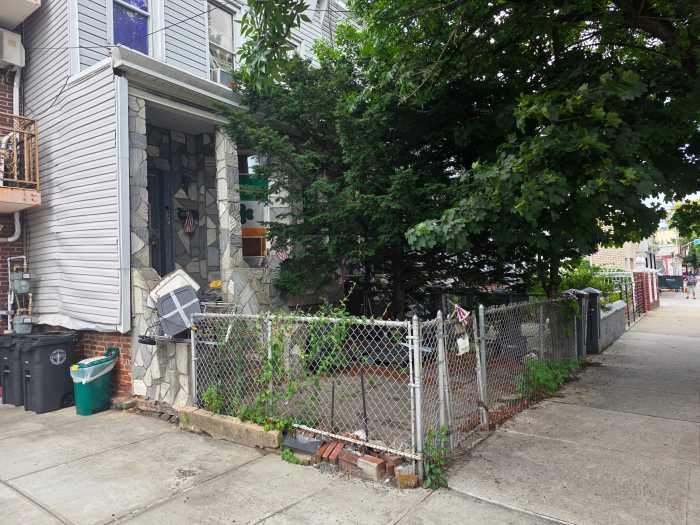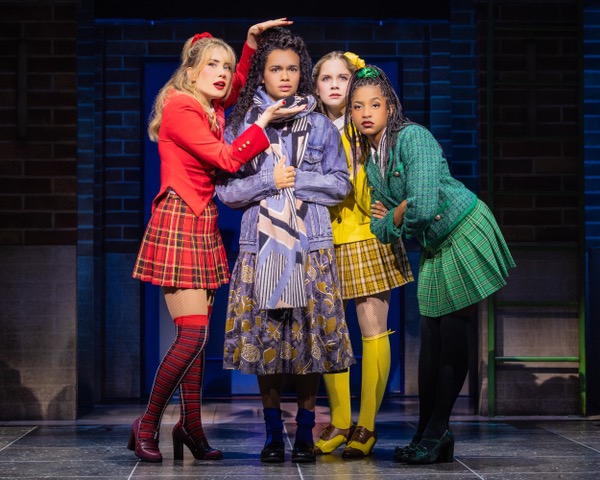By Jerry Tallmer
When Avram Jojne Ehrenreich and his wife Bella, having survived the Holocaust in work camps in Soviet Siberia, arrived in this country along with their two young daughters in 1949, they were first given shelter by HIAS, the Hebrew Immigrant Aid Society, in that extraordinary organization’s beautiful old Lafayette Street building that had started existence in 1849 as the Astor Library.
The little family set down new roots in Brooklyn. Avram Jojne became Abraham Jonah Ehrenreich. He and another survivor set themselves up as the Gem Custom Upholstery and Decorating Company on Rockaway Avenue. A son, Yankele Yitzchok , or Jacob Isaac, was born February 24, 1956. “The first 15 years of my life,” says Jake Ehrenreich, “my father worked seven days a week.”
Telling me this an hour before showtime in the balcony of the Lambs Theater, high above a set that represents his boyhood home at 663 East 91st Street, East Flatbush, the writer and solo actor/narrator of “A Jew Grows in Brooklyn” almost sheepishly (he’s not the sheepish type) pulls from his pocket a folded, well-worn, recent letter from a fan.
“Here, listen,” the son says, running his eyes down to the sentence he wants: “We bought our first living-room set back in 1962 from your father’s store. It was well-made, reasonably priced, and lasted a long time.”
In March 1990, forty-one years after his parents had landed here and were housed a number of days and nights at the HIAS on Lafayette Street, Jake Ehrenreich had appeared on a stage within that very same building. “I did a Liz Swados show for Joe Papp” a year before the death of the dynamic scrapper who as far back as 1967 had acquired 425 Lafayette Street as the locus for his New York Shakespeare Festival.
The Elizabeth Swados show was “Jonah,” and Ehrenreich as the Jonah who gives a whale indigestion “was singing, acting, running, playing drums whenever Jonah gets mad at God – and my father’s name is Jonah. Weird.”
Playing drums is one of the things that Ehrenreich has done well since a kid. “I was banging on desks all my life.” He also plays trumpet, trombone, and piano – “about as well as a tumler [hyper-energetic social director] in the Catskills” – but percussion is Jake’s real talent. Indeed, back in the late ’70s, early ’80s he spent the best part of six months, including a tour of New Zealand, “singing as Ringo, playing as Ringo, moving as Ringo, note for note” – though never, of course, being called Ringo – in the road company of “Beatlemania.”
“What gives me a kick about my show now,” says Brooklyn-boy Ehrenreich, “is the 19-year-old kids who come because they want to hear their parents’ music. And here I’m 50 years old.”
My own music goes back further, said his interrogator. To Benny Goodman.
“Well, I do ‘Sing Sing Sing’ in this show.”
The hinge of “A Jew Grows in Brooklyn” is how different Jake’s life has been from the lives of his parents or his Tante (Great-aunt) Regina. Europe vs. America. Old World Yiddish vs. growing up with baseball. Young Americans like Jake Ehrenreich, who was in the same class at Tilden High School as Al Sharpton (“very active, very vocal”) and – who could know? – someday New York Mets manager Willie Randolph.
When Jake is 8 years old he gets his dad to watch a Mets game on television. “About the fifth or sixth inning,” that same Jake tells the audience at the Lambs, “there’s no score, it’s a real pitchers’ duel, and my father turns to me with: ‘What kind of game is this baseball? Two people play and eight people watch.’ ”
As for Tante Regina, who wrapped every visible piece of furniture in slippery, sweat-inducing plastic … She is something else.
“My family” — in and around Wloclawek, Poland – “was essentially an aristocracy. Tante Regina ran the third largest china factory in Poland. I went there to have a look, ten years ago. When I found her factory, sure enough, on one window there’s a swastika.
“Well, she survived too.”
Jake’s father, drowned in memories or blank-outs of the Holocaust, says: “What could I tell you? What could I tell you?” Tante Regina says: “Di beste menchen hot ingikimn” — the best of us did not survive.
Another couple of productions in which Jake Ehrenreich starred years ago were “Songs of Paradise” and “The Golden Land” – musicals about the 1940s Jewish breakout from murderous old Europe to new worlds across the seas.
“What dawned on me, and frustrated me, while doing stuff like that, was that this was my parents’ story, not my story at all. I had nothing to do with my parents’ survival. I wanted to be an American, and I became one. I imagine people – Korean kids, now – feeling the same way as I did. I started to ask myself: What is my story?”
Now, at the Lambs, backed by a quartet of singer/musicians, he is telling his story. But not quite all of it, unless people ask. In which case he answers, right from the stage.
“My mom passed in 1989. She developed early Alzheimer’s in her 50s. Both my sisters got Alzheimer’s in their 50s. Joanie died last year at 55. Wanda is now 67. You know, I could have written the saddest show in the world, but I have a wife, an 8-year-old son, a wonderful life. My father is frail but still alive at 87. I live a mile from my dad in Monroe, New York; I see him every day.”
Jake Ehrenreich and actress Lisa Randall, from Chicago – “the most unJewish-looking Jew you ever met” – first bumped into one another at the Bitter End, on Bleecker Street in Greenwich Village, in the years when Ehrenreich lived over Mooney’s grocery store on MacDougal Street below Houston.
“I got her phone number, but she would not go out with me. Seven years later, 1993, somebody set us up on a blind date. We were married in 1996. She was 39, I was 40. She’s now a makeup artist, and she helped me write this show.”
Their son Dovy’s full name is Joseph Dov-Behr, in honor of two uncles who died in the Holocaust a half-century before Dovy was born. But now it’s Dovy’s turn to get hooked on that game that two people play while eight others watch.
A JEW GROWS IN BROOKLYN. Written and performed by Jake Ehrenreich. Directed by John Huberth. Musical direction by Elysa Sunshine. At the Lambs Theatre, 130 West 44th Street, (212) 239-6200.



